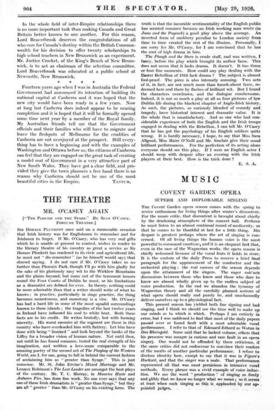THE THEATRE
MR. O'CASEY AGAIN
SIR HORACE PLUNKETT once said on a memorable occasion that Irish 'history was for Englishmen to remember and for Irishmen to forget. If Mr. O'Casey, who has very real gifts which he is unable at present to control, wishes to render to the literary theatre of his country as great a service as Sir Horace Plunkett has rendered to its civic and agricultural life, he must not " dis-remember " (as he himself would say) that shrewd saying. I do not care if Mr. O'Casey takes us no further than Phoenix Park, though I'll go with him gladly for the sake of his gloriously racy wit to the Wieklow Mountains and the plains beyond, but come out of the tenement houses round the Four Courts of Dublin he must, or his limitations as a dramatist are defined for ever. In theory, nothing could be more admirable than that a writer should write of what he knows ; in practice, particularly in stage practice, the thing becomes monotonous, and monotony is a vice. Mr. O'Casey has had a hard life in some of the most squalid surroundings known to these islands ; the tragedies of the last twelve years in Ireland have inflamed his soul to white heat. Both these facts are to his credit. He writes brutally, but with burning sincerity. His worst enemies at the moment are those in this country who have overloaded him with flattery. Let him have done with being lionized and look beyond the banks of the Liffey for a broader vision of human nature. Not until then, not until he has found romance, tested the real strength of his imagination, and written a love-scene comparable to the amazing poetry of the second act of The Playboy of the Western World, am I, for one, going to fall in behind the current fashion of acclaiming him as " greater than Synge." This is just nonsense. Mr. St. John Ervine's Mixed Marriage and Mr. Lennox Robinson's The Lost Leader are amongst the best plays of the century. Mr. T. C. Murray, in Maurice Harte and Autumn Fire, has done fine work. No one ever says that any one of these Irish dramatists is " greater than Synge," but they are all " greater " than Mr. O'Casey on his_ xisting form. The
truth is that the incurable sentimentality of the English public) has scented romance because an Irish working man wrote (in Juno and the Paycock) a good play above the average. An inverted form of snobbery peculiar to London society from time to time created the rest of the illusion. Personally, I am sorry for Mr. O'Casey, for I am convinced that he has the root of high drama in him.
The Plough and the Stars is crude stuff, and was written, I fancy, before the play which brought its author fame. This does not mean that it lacks drama. It doesn't. It has three or four fine moments. How could any play dealing with the Raster Rebellion of 1916 lack drama ? The.subject is almost fool-proof. The piece is also intensely amusing. Two acts of it, in fact, are not much more than knock-about farce, re- deemed here and there by flashes of brilliant wit. But I found the characters overdrawn, and the dialogue cumbersome. Indeed, it is not so much a play at all as four pictures of 19w Dublin life during the blackest chapter of Anglo-Irish history. As such, the pictures, so curiously blended of comedy and tragedy, have historical interest and dramatic value. It is the whole that is unsatisfactory. And as one who had con- siderable experience of both the English and the Irish troops engaged in dealing. with. the Rebellion, I can tell Mr. O'Casey that he has got the psychology of his. English soldiers quite wrong. It is hardly necessary, I hope, to say that Miss. Sara Allgood, Miss Maire O'Neill and Mr. Sinclair give their usual brilliant performances. For the perfection of its acting alone everyone should see this play. If I were an English actor I should weep with despair after an evening with the Irish players at their best. How is the trick done ?
E. S. A.










































 Previous page
Previous page